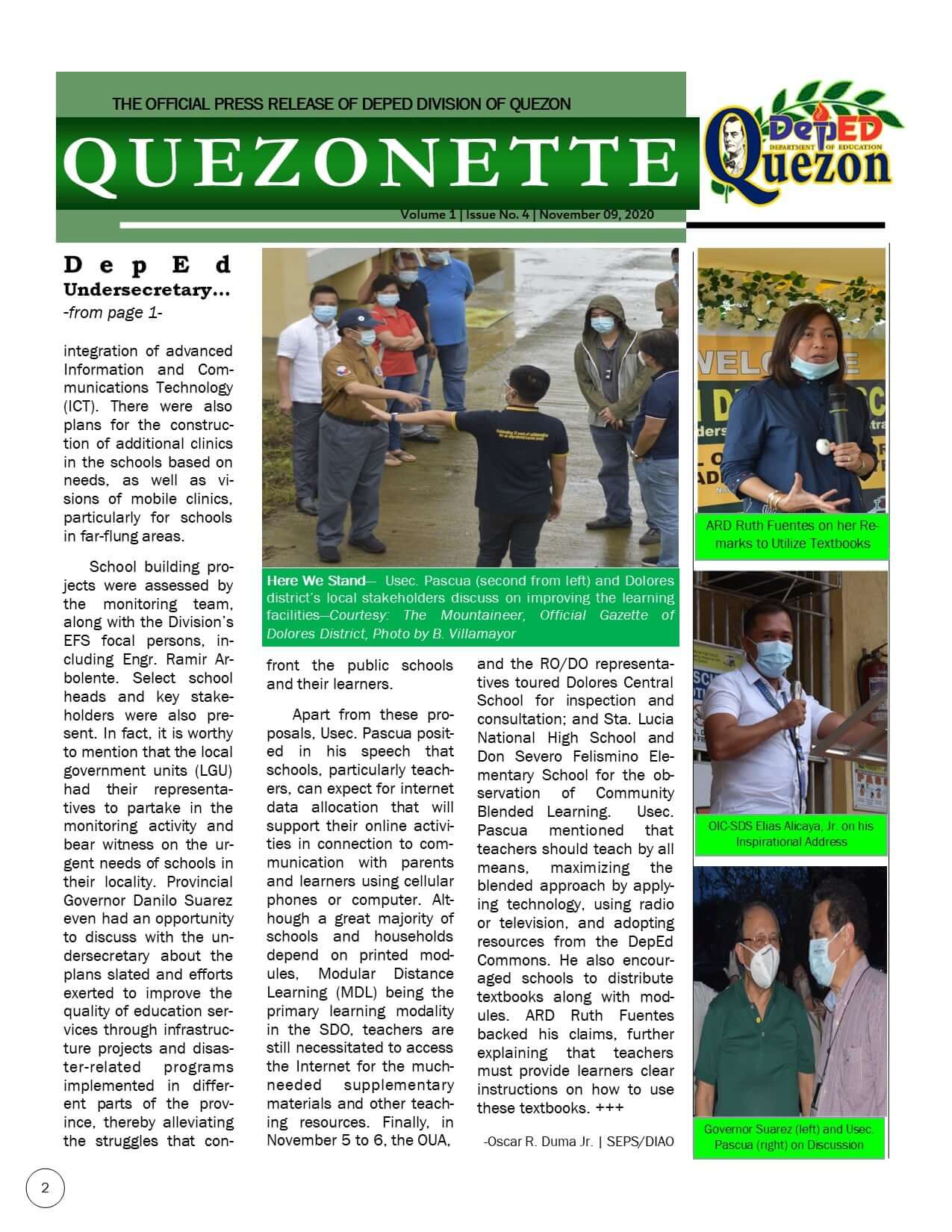

November 3-6, 2020 — To witness the situation of schools in DepEd Quezon for the delivery of interventions in view of the typhoon onslaughts in the province, the Department of Education (DepEd) through the Office of the Undersecretary for Administration (OUA) conducted a field-based monitoring in the districts of Gumaca, Pitogo, Mulanay and Dolores.
Usec. Alain Del B. Pascua, together with his OUA team, the DepEd Region IV-A CALABARZON FPs headed by ARD Ruth Fuentes and the SDO Quezon nurses and engineers led by OIC-SDS Elias Alicaya Jr. visited the typhoon-affected schools from the second, third and fourth congressional districts, as well as evaluated Gabaldon buildings and gathered relevant data on Education Facilities. He later added the importance of the maximization of other learning resources in the implementation of the Basic Education Learning Continuity Plan (BE-LCP), regardless of the chosen learning modality in schools.
The SDO Quezon’s top management, through the ardent leadership of OIC-SDS Alicaya, took part in this historic endeavor, beholding the concerted effort of all concerned despite the threat of COVID-19 and the feisty weather condition.
In November 3, Gumaca National High School was first on the itinerary, where inspection of the school Gabaldon was done. The monitoring team also took important note on the damaged buildings due to the consecutive typhoons that hit the province, not to mention “Rolly” which recently ravaged many schools in the third and fourth districts, both in high and low areas.
An evaluation of the district/school clinics was carried out, including equipment readiness and operational capacity when it comes to managing patients. In November 4, the Dental Clinic and Dental Chair of Pitogo National High School had been inspected. On the same day, Mulanay Central School was visited to check on its school clinic.
As part of the Department’s future targets that will benefit primarily the public schools in the country, partner universities shall be tapped to facilitate online assistance to school
clinics and offering of medical services via the integration of advanced Information and Communications Technology (ICT). There were also plans for the construction of additional clinics in the schools based on needs, as well as visions of mobile clinics, particularly for schools in far-flung areas.
School building projects were assessed by the monitoring team, along with the Division’s EFS focal persons, including Engr. Ramir Arbolente. Select school heads and key stakeholders were also present. In fact, it is worthy to mention that the local government units (LGU) had their representatives to partake in the monitoring activity and bear witness on the urgent needs of schools in their locality. Provincial Governor Danilo Suarez even had an opportunity to discuss with the undersecretary about the plans slated and efforts exerted to improve the quality of education services through infrastructure projects and disaster-related programs implemented in different parts of the province, thereby alleviating the struggles that confront the public schools and their learners.
Apart from these proposals, Usec. Pascua posited in his speech that schools, particularly teachers, can expect for internet data allocation that will support their online activities in connection to communication with parents and learners using cellular phones or computer. Although a great majority of schools and households depend on printed modules, Modular Distance Learning (MDL) being the primary learning modality in the SDO, teachers are still necessitated to access the Internet for the much-needed supplementary materials and other teaching resources.
Finally, in November 5 to 6, the OUA, and the RO/DO representatives toured Dolores Central School for inspection and consultation; and Sta. Lucia National High School and Don Severo Felismino Elementary School for the observation of Community Blended Learning. Usec. Pascua mentioned that teachers should teach by all means, maximizing the blended approach by applying technology, using radio or television, and adopting resources from the DepEd Commons. He also encouraged schools to distribute textbooks along with modules. ARD Ruth Fuentes backed his claims, further explaining that teachers must provide learners clear instructions on how to use these textbooks.
-Oscar R. Duma Jr. | SEPS/DIAO



All content is in the public domain unless otherwise stated.
Learn more about the Philippine government, its structure, how government works and the people behind it.
Copyright © 2020 Department of Education DIVISION OF QUEZON
Template Designed: GOVPH | Developed and maintained by Rommel Oczon